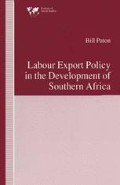Abstract
It is a peculiar thing that a person should be electrocuted for crossing a fence to go to work, yet that is exactly what has happened to many labour migrants in Southern Africa.1 A century ago, today’s states did not yet exist in the region, and most territories possessed only fledgling administrations. The European men in their small colonial buildings lacked much capacity to even control border-crossing migrants, let alone electrocute them. Today we see their descendants — a mutually exclusive system of formally self-determining states with their own armies and currencies, and with more and more rigid control over people’s movements among them. Worldwide, the legal barriers to the passage of the majority of migrants and travellers continue to thicken, with industrialised states clutching at legal straws and quickening the pace in their game of human ‘hot potato’.
Access this chapter
Tax calculation will be finalised at checkout
Purchases are for personal use only
Preview
Unable to display preview. Download preview PDF.
Copyright information
© 1995 Bill Paton
About this chapter
Cite this chapter
Paton, B. (1995). Introduction: Labour Export in Theory and in Southern Africa. In: Labour Export Policy in the Development of Southern Africa. Palgrave Macmillan, London. https://doi.org/10.1007/978-1-349-13499-1_1
Download citation
DOI: https://doi.org/10.1007/978-1-349-13499-1_1
Publisher Name: Palgrave Macmillan, London
Print ISBN: 978-1-349-13501-1
Online ISBN: 978-1-349-13499-1
eBook Packages: Palgrave Social & Cultural Studies CollectionSocial Sciences (R0)

